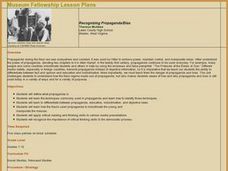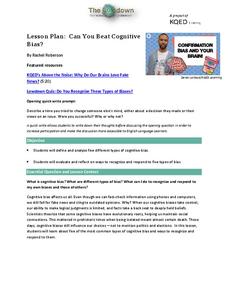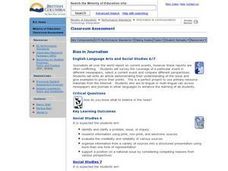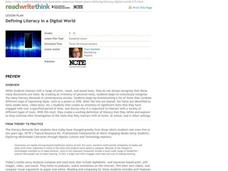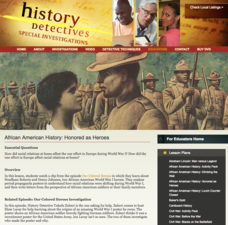iCivics
Propaganda: What’s the Message?
As class members progress through eight fully prepared learning stations, they will identify how bias is present in persuasive media, as well as differentiate among types of propaganda techniques like bandwagon propaganda and the use of...
Curated OER
Recognizing Propaganda/Bias
Middle and high schoolers examine the uses of propaganda during the Nazi era. Using examples of propaganda used by Hitler, they discuss how it changed the thinking and ideas of people exposed to it. In groups, they identify how and why...
NPR
Can You Beat Cognitive Bias?
In a time of fake news, media manipulation, and Internet trolls, a resource equips learners with the tools they need to recognize and combat resources that are designed to appeal to our cognitive biases. Introduce learners to five...
Newseum
Weed Out Propaganda
Young scholars study four essential propaganda techniques: Simplification, Exploitation, Exaggeration, and Division (S.E.E.D.). Individuals select an example of propaganda from the past and present then compare how the key elements have...
Prestwick House
Understanding Language: Slant, Spin, and Bias in the News
We live in a time of fake news, alternative realities, and media bias. What could be more timely than an activity that asks class members to research how different sources report the same topic in the news?
Newseum
Disinformation Nation: Separating Politics and Propaganda
Separating political rhetoric from propaganda is no small feat. Class members are challenged to examine two different sources about a candidate in an upcoming election and determine whether the primary purpose of the source is to inform...
Curated OER
Propaganda: Making a Commercial
Seventh graders study different propaganda techniques. In groups, they write and perform a 60-second TV or radio commercial. Classmates rate the effectiveness of the commercial and whether or not they might buy the product.
Curated OER
Propaganda
How does word choice affect the reading of a text? Compare two headlines that were written about the same event. Is one biased? Discuss how word choice often reveals the author's feelings about a topic. Then look at different techniques...
Curated OER
Understanding Propaganda
Students define propaganda and give examples from the mass media. In this propaganda lesson, students review examples of propaganda and then research versions of it in the mass media.
Curated OER
Media Literacy: Discovering and Understanding Propaganda
Ninth graders study different types of propaganda and select an issue that is significant to them. In this exploratory lesson students design and create posters on the topic of their choice and write a narrative describing it.
Curated OER
Bias, Prejudice and Propaganda
Twelfth graders examine bias, prejudeice, and propaganda in reading selections. They view commercials and print ads, discuss how the advertisers are trying to convince them of something, and keep a commercial journal.
Curated OER
Dragonwings: Evaluate Chapters 10-12
As your class finishes the novel Dragonwings, use these culminating projects. A vocabulary list is given for chapters eleven and twelve and either an epitaph or letter activity concludes the book. The final project consists of creating a...
Middle Tennessee State University
John Brown: Hero or Villain?
"Love it or leave it." "You're either for us or against us." Rhetoric and it's polarizing effects are the focus of a instructional activity that uses John Brown's attack on Harper's Ferry as an exemplar. Groups examine primary source...
Curated OER
Bias in Journalism
Students evaluate the credibility and reliability of various sources. Students survey the coverage of a particular event in different newspapers, select a current event and compare different perspectives. They write an article...
ReadWriteThink
Defining Literacy in a Digital World
What skills are necessary to interact with different types of text? Twenty-first century learners live in a digital world and must develop a whole new set of skills to develop media literacy. Class members engage in a series of...
Film Education
Nineteen Eighty-Four: Orwell
Warning or prediction? Nineteen Eighty Four is the anchor text for a series of tasks that ask readers to compare the novel to the film as well as current events to those pictured in George Orwell's dystopian classic.
Curated OER
Fighting Fake News
Fake news. Alternative facts. Internet trolls. In an age of Newspeak, it's increasingly important to equip 21st century learners with the skills needed to determine the legitimacy of claims put forth on social media, in print, and in...
Media Smarts
Authentication Beyond the Classroom
In an age of fake news, alternative facts, and Internet trolls it is essential that 21st Century learners develop the skills they need to authenticate the facts in viral news. Here is a great way to begin with a resource that provides...
Curated OER
Censorship in the Classroom: Understanding Controversial Issues
Students examine propaganda and media bias and explore a variety of banned and challenged books. Following this, students choose a side of the censorship issue and support their position by developing an ad campaign about the banned book...
Curated OER
The "Ad" Survey-What Makes a Print Ad Convincing?
Students develop opinions from a variety of materials, recognize and analyze bias, propaganda and stereotypes, and evaluate effectiveness of print advertisements.
Madison Public Schools
Journalism
Whether you are teaching a newspaper unit in language arts, covering the First Amendment and censorship in social studies, or focusing on writing ethics in journalism, a unit based on the foundations of journalism would be an excellent...
PBS
African American History: Honored as Heroes
To gain an understanding of the treatment of African American soldiers during World War I, class members watch an excerpt from the History Detectives film, Our Colored Heroes, and then examine three recruitment posters from that time...
Curated OER
News Journalism Across the Media: Introduction
Although students are aware of news as information that influences their perceptions of the world, they are often unaware of the various ways to present that information. Encourage them to investigate, discuss, analyze and make valuable...
Southern Poverty Law Center
Evaluating Online Sources
All sources are pretty much the same, right? If this is how your class views the sources they use for writing or research projects, present them with a media literacy lesson on smart source evaluation. Groups examine several articles,...
Other popular searches
- Free Bias and Propaganda
- Bias and Propaganda Tactics
- Author's Bias & Propaganda
- Authors Bias & Propaganda
- Propaganda and Bias
- Bias and Propaganda Ww2



